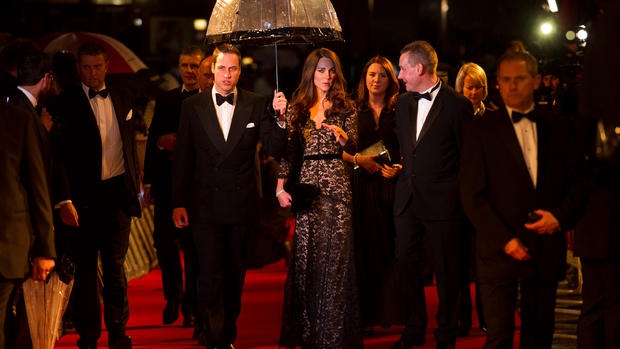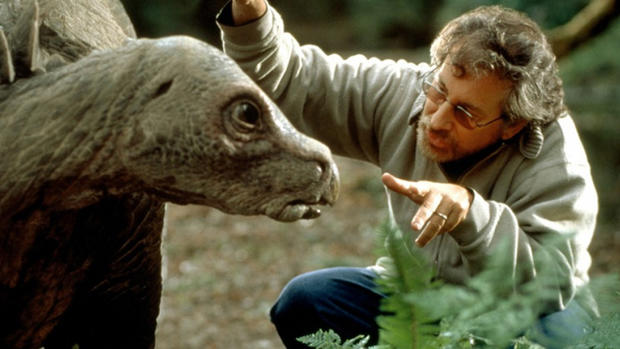"War Horse": From page to stage and screen
The new movie "War Horse" tells the story of an English boy and his farm horse torn apart by World War I. The film was directed by Steven Spielberg, who sat down with Martha Teichner for some Questions-And-Answers:
It's not every day a horse walks the red carpet with a film's director, but last Sunday, Steven Spielberg shared the limelight at the U.K. premiere of "War Horse" - not to be upstaged, even by royalty. The next day the London papers reported that Spielberg's wife had to pass Kate Middleton Kleenex when the emotional parts made her cry.
"War Horse" is about Joey, a farm horse sold to the British Army in 1914, at the beginning of World War I, and sent to the battlefront . . . and about Albert, the boy who loves him so much he sets out to find him.
Spielberg said he took on the job of making the film because "I just loved Joey, and I loved his relationship with Albert, and I just hated to see them separated and I couldn't wait to see how they would ever come together again. That really pulled me."
Long before a single scene of Spielberg's film was shot, "War Horse" was a novel for young adults published in 1982. Michael Morpurgo intended it more as an anti-war statement. It was inspired by conversations he had at age 17 at his local pub in the picturesque English village of Iddesleigh in Devon with an elderly WWI veteran named Albert Weeks.
"I said, 'What regiment were you with?'" Morpurgo recalled. "He said, 'I was over the Devon yeomanry . . . I was there with horses.' And he started talking, and the more he talked the more upset he became, and the more engaged I became in what had happened to him - this young man who'd come away from a completely pastoral background and had been thrust into this hideous, hideous trench warfare. The only thing that kept him sane was that he said the he would talk to his horse."
Ten million men died in WWI, and it's believed about the same number of horses.
"So what I had to do was to start out with an idea which would be acceptable to the sensitivities of young people, which is why it's told through the eyes of a horse, because the child can access that much more readily," Morpurgo said.
In other words, Joey telling his own story.
Now fast forward nearly three decades. "War Horse," the play, is a theatrical phenomenon, and the National Theatre of Great Britain's most successful production ever. Last year it opened at Lincoln Center in New York City, and won five Tony Awards.
The story is told by larger-than-life puppets . . . horses so extraordinary you forget they're not real.
For the stage adaptation, details from the book had to be changed.
Morpurgo describes his first impression of the stage adaptation and what was missing from his book: "Picky, picky, picky!" he said. "But then when I'd seen it once or twice, and I was able to sit back and relax and look at it not as a dramatization of my story - it's like handing a baby over, you know?"
Morpurgo has actually gotten to be in it, as a bidder when Joey is auctioned off as a colt, so he no longer minds that scenes and characters were left out (or even added, like the goose).
"I don't know, the goose made me laugh," Spielberg said. "The goose came out, it was welcome relief, I needed to laugh!"
So the goose made it into Spielberg's movie.
"I had a few tears in my eyes in the first act," he said. "I needed that goose to dry my eyes, and I needed that to divert my attention from what I knew was inevitably coming down the road against this family and against Joey and Albert being together."
In the film, the horses are real. Fourteen different horses played Joey.
From book to play to movie, one story . . . three radically different takes.
When asked what can and cannot be done when translate a book or play to the screen, Spielberg replied, "Well, you can pretty much do anything because you know, in terms of the book and the play, it's different. You have to basically devote all of your energy and all of your passion to the medium at hand, and so there was a point where I had to forget the book and I had to forget the play, and I just had to make my version of 'War Horse.'"
Central to all three versions: The end of an era in warfare, the fact that WWI was when tanks replaced war horses. In the play, a moment symbolized by a terrible confrontation between horse and tank.
It's also in the film.
In all three tellings, Joey's run ends in the hellish desolation of no man's land. He's trapped in the tangle of barbed wire separating the Germans and the English, who stop fighting when they see him.
"I see it as a story about, you know, the connections that an animal can make - that perhaps only an animal can make - in bringing people together and bringing everybody on the same side of an issue, even an issue as large as the great war, the first World War," Spielberg said. "And sometimes it takes something as, I guess, primal, as a magnificent horse to let everybody share a common goal, which is this: Rescue it.
"And I think that's where the story came down emotionally for me."
A story that's taken on a life of its own. Michael Morpurgo's novel begins in the old school they use now for the village hall. Below the clock that has stood always at one minute past ten hangs a small dusty painting of a horse, Joey. Tourists flocked to see it, but of course, it didn't exist.
"The problem is that they go to the lady who's a dear friend of mine who lives next door to the village hall and they knock on her door and they say, 'Could we see the picture?' And she said, 'Well, it's gone out to be cleaned' or 'It's in a museum' - all sorts of fibs she was telling!" said Morpurgo.
While on location with Spielberg, Morpurgo and his wife commissioned an artist working on the film to paint one.
So now below the clock there really is a painting of Joey - a fictional horse, with truth to tell.
WEB EXTRA: An extended interview with Michael Morpurgo on horses' military service and the genesis of his story.
For more info:
- "War Horse" (official movie website)
- "War Horse" - Vivian Beaumont Theater
- "War Horse" on Broadway
- Michael Morpurgo's website
- "War Horse" by Michael Morpurgo (Scholastic Books)
- warhorseart.com
- National Theatre
- ted.com (Handspring Puppet Company)
- Handspring Puppet Company

